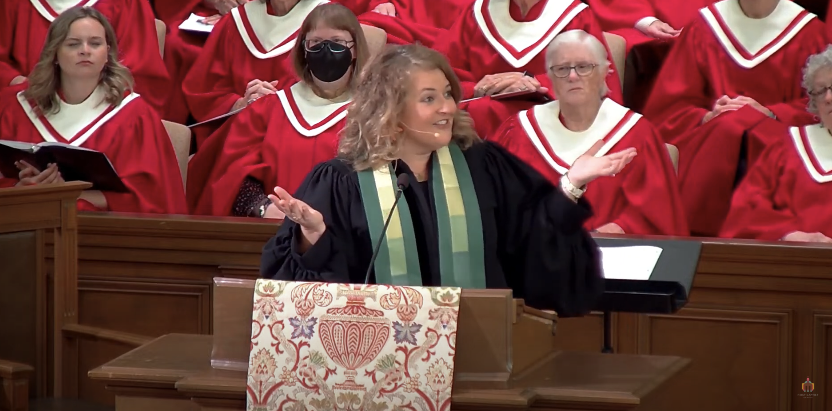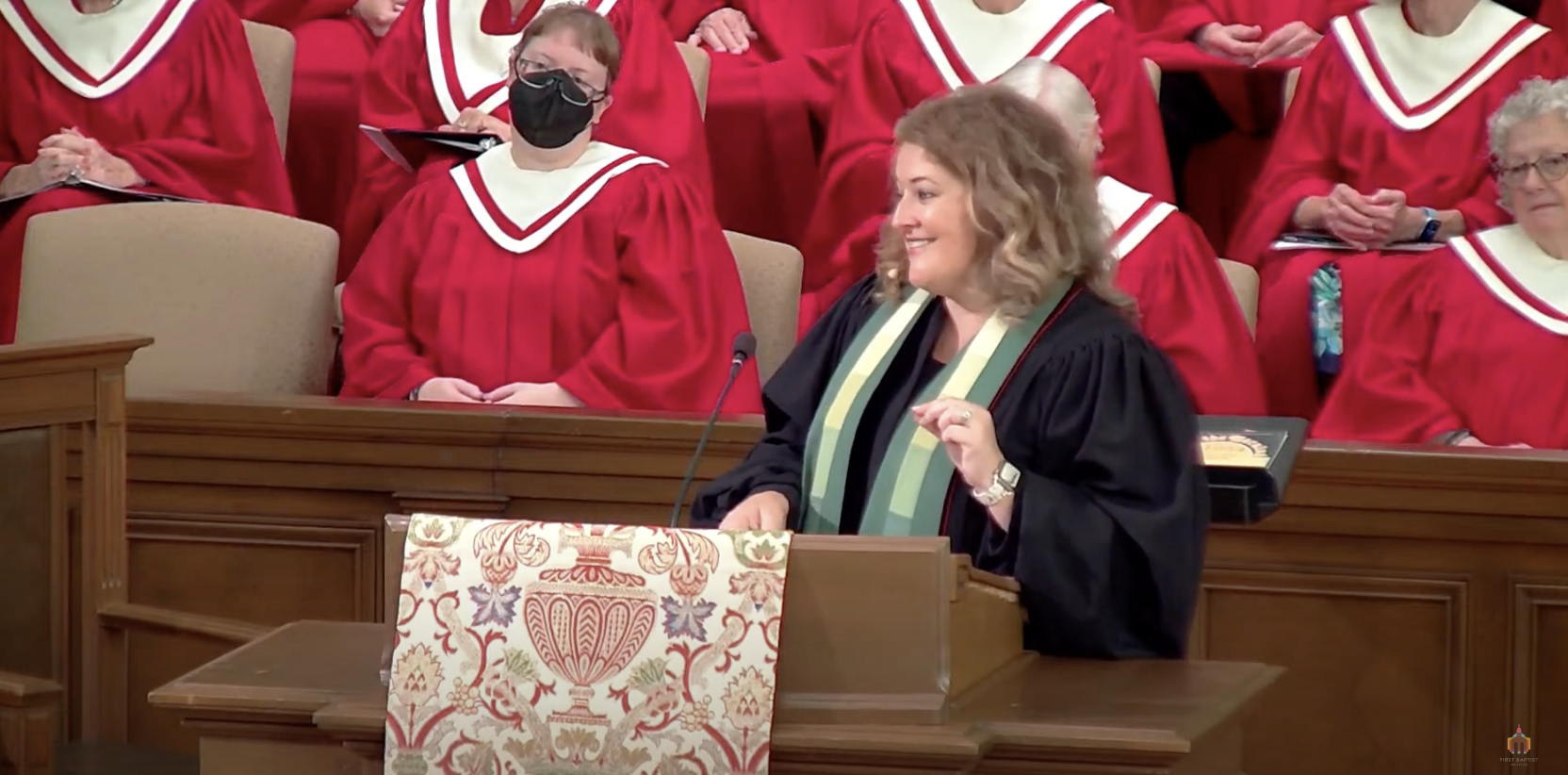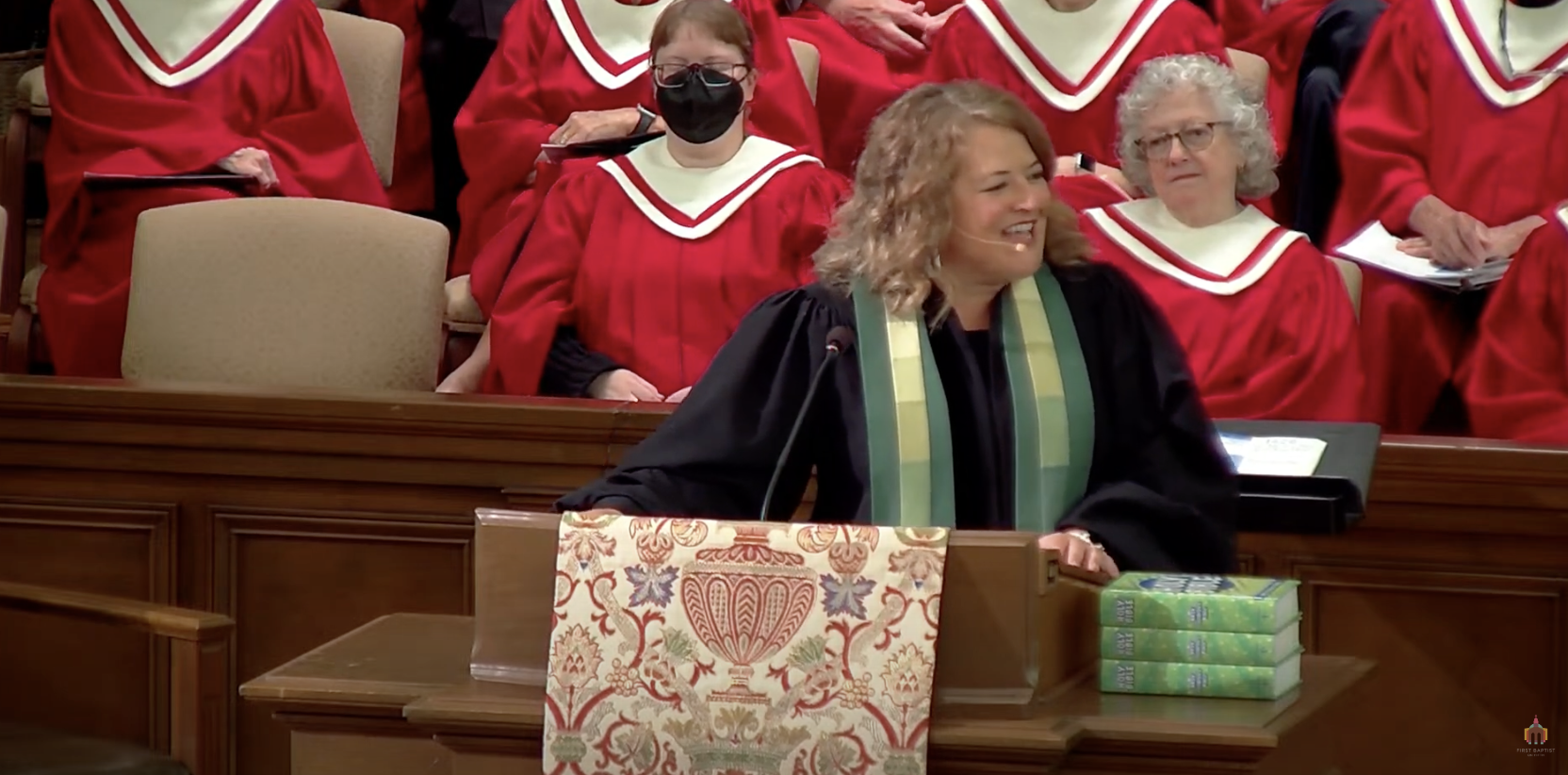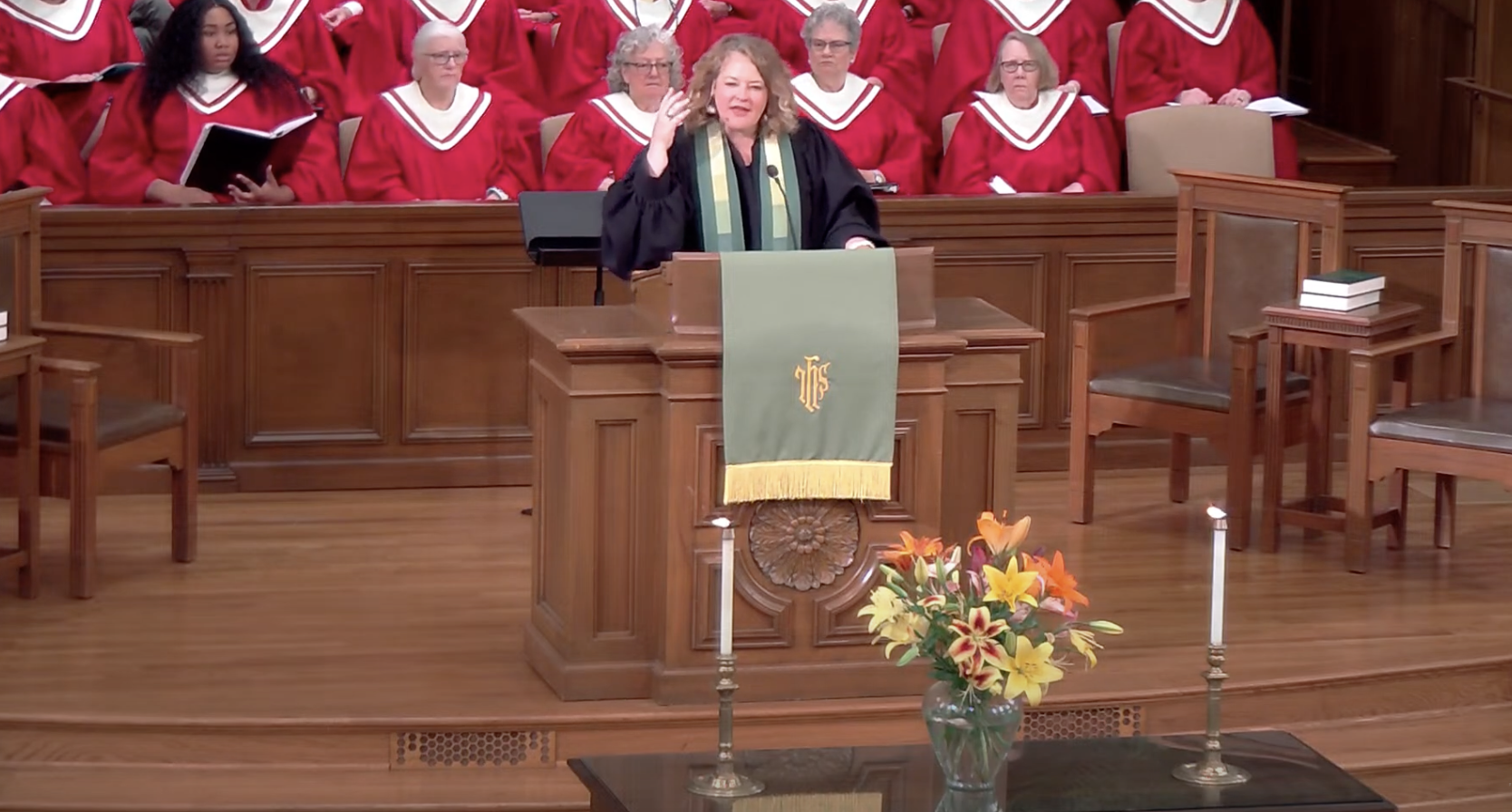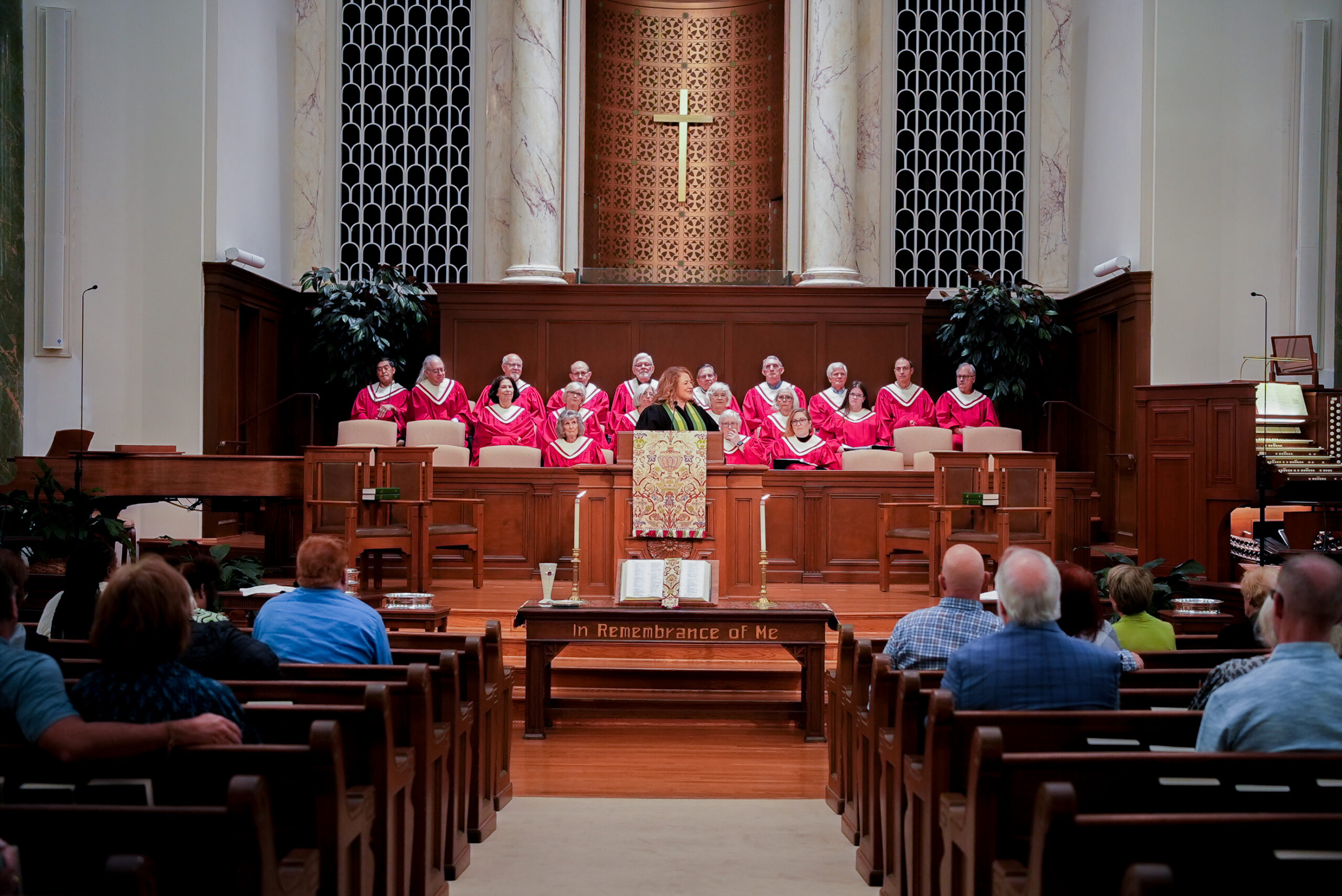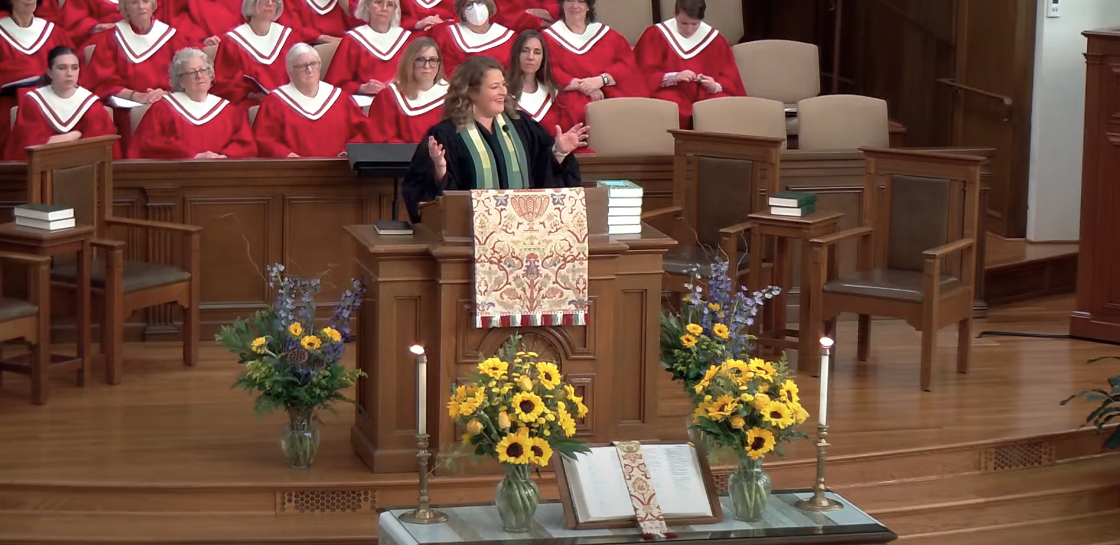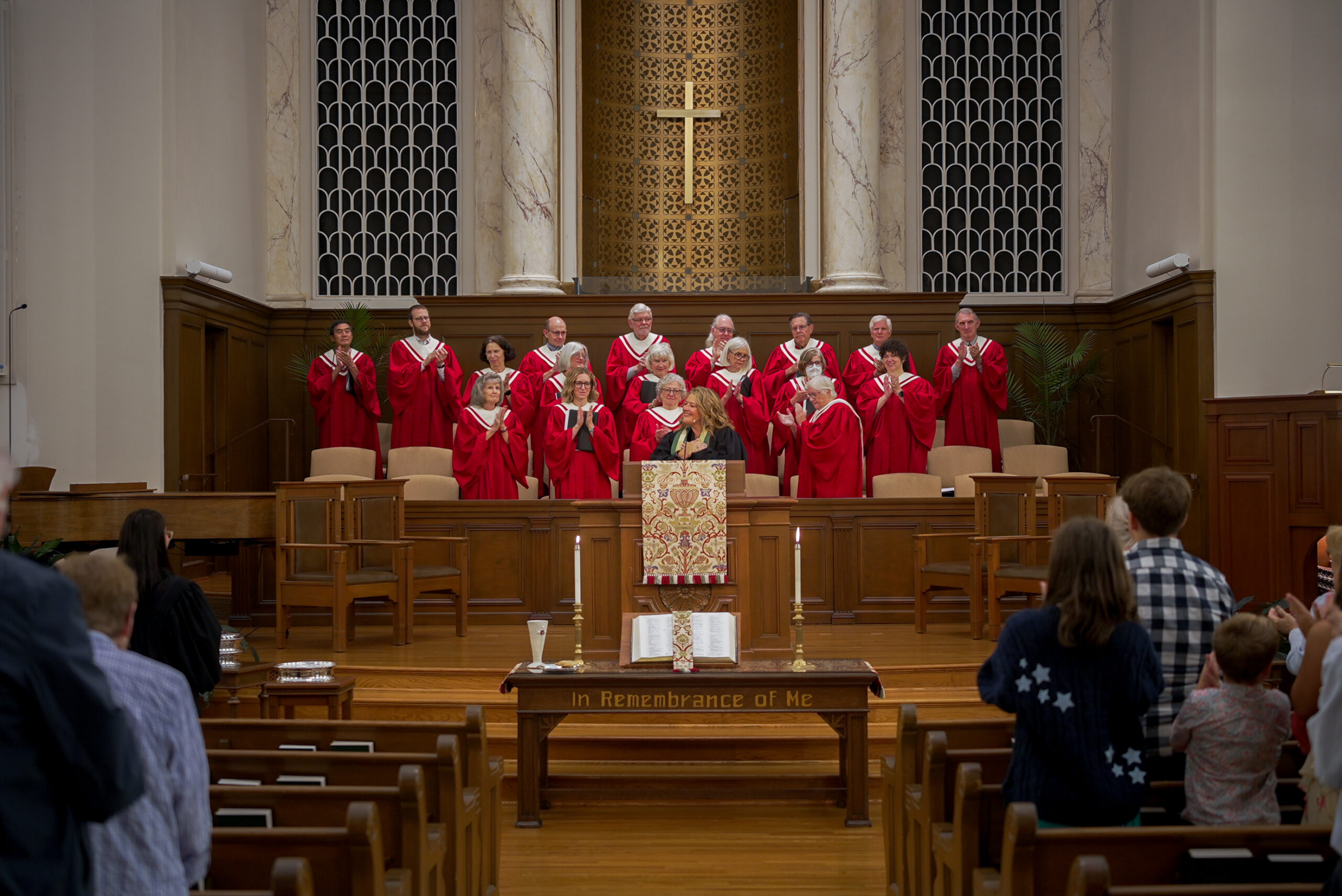I.Perhaps something you should know about your pastor is that among the things in this world that draw my highest religious devotion most are, well, peaches. I am devout about peaches, even, I dare say, a touch orthodox. Peaches are only to be enjoyed fresh, only from upstate South Carolina, only in the summer, preferably from one of the Abbott’s Farms peach stands off the side of the interstate. And once the basket you buy is gone, it’s gone. No grocery store peaches are going to cut it in my book.
Several years ago, I was feeling generous at the peach stand when en route home from our family’s summer vacation. “Let’s get two baskets this year,” I said to Josh. “One for us, and one to give away.” I imagined with a smile how my colleagues and neighbors and friends would savor summer’s greatest delight like me.
After several days of peaches on cereal and yogurt and ice cream; in salsa and cobbler and salad; atop the breakfast plate, the lunch plate, and the dinner plate, you get the gist – we were nearing the end of our basket. Now when I tell you that I’m religious about peaches, I also mean I lament when they’re gone – in the weeping and gnashing of teeth type of way. Which means I also need to confess to you that I spied that second full basket for colleagues, neighbors, and friends, the one that now in the moment I somehow couldn’t bring myself to divide and distribute, and… well… I caved. I mean, I just caved right then and there. I thought to myself, “you know, I hadn’t actually told anyone I was going to give them peaches! They’re not expecting them, so they won’t know the difference!” And with that rationalization partially pardoning my guilt, I grabbed one off the top and sliced it up to enjoy.
I suppose you can see where this is going. The first few were, of course, delicious. But my breakfast peach the next morning had a brown spot to cut off. Then the day after that, the handful I planned to cut up for the kids were moldy on the top. By the end of the day, fruit flies were swarming around my kitchen. I realized in horror that the whole batch had gone bad, right there on my counter. You see, hoarding peaches led to rotting peaches, that in my selfish wish to keep and save, I hadn’t actually been able to keep a thing. So clouded was I by my possessiveness, I forgot that abundance comes in the sharing, right? Somehow it seems the miracle comes not when we keep, but when we give away.
II.Once every third August, the lectionary, that three-year cycle of scriptural texts intended to capture a snapshot of the biblical story, offers several weeks in the Gospel of John. We don’t swing from story to story each week, rather we camp out and hunker down in John chapter 6. As we’ll see, scholars call this the “bread” chapter, where in story and teaching, Jesus shares the good news that he is the bread of life.
You might remember from our summer stretch in Mark that Jesus was readily going back and forth across the Sea of Galilee with his disciples, all while curious crowds followed him in droves. That’s the same backdrop for today’s story, the only miracle story of Jesus recorded in each of the four gospels.
And it’s a familiar story, of course. A crowd follows Jesus. Jesus wants to feed them and wonders aloud to the disciples about how to do so. Among them, Philip is pessimistic, and Andrew is practical. A boy with the five barley loaves and two fish becomes the spark of Jesus’s miraculous multiplication. He took them and shared them, enough for everyone to eat their fill and have plenty leftover. “Gather up the fragments,” Jesus tells his disciples, “so nothing is lost.” As they did, the people recognized the sign: “this indeed is the prophet who is to come into the world,” they say, astonished.
Each gospel writer’s take on this story bears their unique touch, but the contours of the narrative are the same. Let’s recognize here that John’s distinctive voice connects Jesus with Moses: Jesus goes up a mountain like Moses, wonders how to feed all the people like Moses, is recognized as a prophet like Moses, and later miraculously crosses the sea similar to Moses. And like the exodus of the Israelites from Egypt gave them liberation and grace and abundance, so too is liberation and grace and abundance newly available through the person of Jesus Christ.
I bet the people on the mountain that afternoon didn’t see all that just yet though. Just imagine their chatter – I’m hungry, kids whined to their parents. I wonder what he’s going to do?, this group over here asked. Am I seeing what I think I’m seeing?, that group over there marveled. Did they know a miracle was unfolding before their very eyes?
And imagine how that story traveled. What happened after that day. How people began to wonder, how did he do it actually? Did he conjure the bread and fish in his hands? Did he multiply it as he passed it out? Or is the multiplying rumor just fake news, and maybe he just cut five loaves and two fish into such small morsels and divided it, such that everyone got a bite, and that bite felt like a feast?
We don’t know. We don’t know how he did it. Frankly, that’s part of the miracle. Part of the liberation and the grace and the abundance.
But today, I want us to consider that perhaps there was another part of the miracle too. The part that comes when Jesus’s first response to all the people was compassion and to ask Philip for advice. The part that comes when Philip, bless him, didn’t think it possible because he was mired in scarcity, but Jesus imagined another way out of abundance. The part that comes when Andrew tells Jesus about the boy with his lunch. The part that comes when people follow Jesus and then start living more and more as he did. The part that comes when we see plenty instead of less, when we share instead of hoard, when we find freedom in relinquishing the very thing we thought we couldn’t possibly abandon, grace and abundance on the other side.
You can see them, can’t you? The crowds gathered there on the mountain, thinking they had nothing to offer in this moment. But Jesus knew. He knew that if given the opportunity and the imagination, they’d reach for the pita in their pockets. They’d share the bunch of grapes in their satchel. They’d hand over their olives, the nuts, the seeds, yes maybe even their very favorite summer fruit. They’d recognize that this One, this prophet, this Jesus is showing them a more excellent way to live. That they don’t have to be afraid or stingy anymore.
Friends, what if the other part of the miracle came in the sharing? What if they opened their hands, and put a little in the baskets as they passed by? What if they recognized in the baskets their neighbor’s flatbread, or their grandma’s sourdough, or their teacher’s lavash? What if the stirring they felt within them wasn’t just bellies fed, but their own hearts loosening as their hands opened? What if the miracle happened not just to them, but in them, and maybe in each of us too?
Barbara Brown Taylor says this: “the problem with miracles is that we tend to get mesmerized by them, focusing on God’s responsibility and forgetting our own. Miracles let us off the hook. They appeal to the part of us that is all too happy to let God feed the crowd, save the world, do it all. We don’t have what it takes, after all…. “Sitting in the crowd, waiting for God to act,” she continues, “we can hang on to our own little loaves of bread. They’re not much; they won’t go far. ‘Send the crowds away to go into the villages,’ the disciples say, ‘and buy food for themselves.’
“‘They need not go away,’ Jesus says, ‘You give them something to eat.’ Not me, but you; not my bread but yours; not sometime or somewhere else, but right here and now. Stop looking for someone else to solve the problem and solve it yourselves. Stop waiting for food to fall from the sky and share what you have. Stop waiting for a miracle and participate in one instead.”1
III.I don’t often take to the dictionary when writing sermons, but I did this week. But this story reminded me of a practice as familiar to me as any: a pot-luck meal. The trusted Oxford English Dictionary defines “potluck” as “a shared meal consisting of whatever guests have brought.”2 Then Wikipedia tells me that the term “pot-luck” got its start in the 16th century from British writer Thomas Nashe, who used it to describe “food provided for an unexpected or uninvited guest.”3 Back then, folks would let their leftover food simmer in a pot on the off chance someone might arrive at their door hungry. That guest would get “the luck of the pot.”4 This tradition has evolved over the years, taking particular form nearly 100 years ago during the Depression where a “pot-luck” became a communal meal where everyone brings a dish.
We church folk have been doing communal meals as far back as anyone remembers, even from the very first communities of Christians who, as Acts 2 reminds us, “broke bread together and ate with glad and generous hearts.” Over time, we called it a “covered dish meal, or “dinner on the grounds.” But no matter its name, Christians have discovered that there’s just something holy in the coming together, something sacred at the table in bringing what you have, sharing food and receiving food, and leaving nourished in both body and spirit. In some ways, this is Christians at our very best.
IV.You might remember that as the summer began, we gathered for our church picnic back in May. We called it a picnic, but really it was a pot-luck. Scores of us pulled up to the picnic shelter with our casseroles and our cold salads, ready to add to the feast. In fact, there were so many of us bringing such a spread, the Hospitality Ministry Team had to push all the dishes as close as possible, because the tables were so full! You remember: all seven platters of deviled eggs – some with paprika, some without; pasta salads and fruit salads and broccoli salads; David’s pound cake and Josh’s mac and cheese and Joe’s chicken, the hastily-bought clamshells of sugar cookies from Harris Teeter, and of course several dozen doughnuts from Krispy Kreme. We had so many people and so much food to eat, we even ran out of forks!
The table couldn’t hold all the abundance, because everywhere I looked, I saw abundance. I saw it in a pile of our youth playing frisbee with our kids. I saw it in new members meeting longtime members, and longtime staff welcoming new staff. I saw it in warm hugs and focused conversation. I saw it in you, in your dazzling diversity: queer couples and babies and single seniors and dogs and college students and young retirees and big families, all bringing who you are and what you have to share in beloved community, all drawn in not just because you love this church, which you do, but because we’re all drawn in by the liberation and grace and abundance of Jesus. I have to tell you – I sat there with my fried chicken and my spoon and tears running down my face, for all I saw was miracle.
V.In the same spirit, I wonder if that day on the mountainside by the sea of Galilee became the world’s first pot-luck, a shared meal made from whatever was brought, as unexpected as it was. A miracle nonetheless, shimmering with the unique presence and purpose of Jesus.
And in that spirit, Jesus encourages us even today: come hungry to meet him, not just when you’re satisfied and ready. Come hungry yet willing to share. Willing to give a peach or pie, a loaf or a fish. Willing to give of yourself, your time and energy and resources and compassion, because you know that what you’ll receive will nourish you so much so there will be leftovers for later. Willing to open your heart and hands to receive the gift of community, a gift that tastes like liberation and grace and abundance all wrapped into one. Willing to share in the miracle.
Liberation and grace and abundance. A pot-luck where everyone brings a little of what they have. Ordinary, you might say. But we know they’re miracles all the same. May we taste and see that God is good! Amen.


